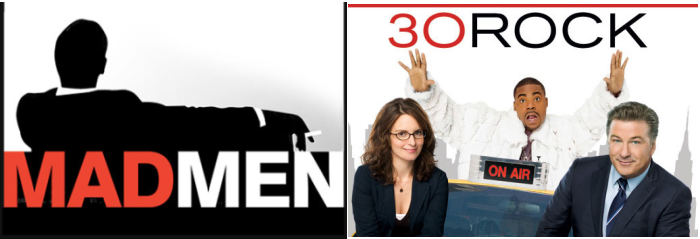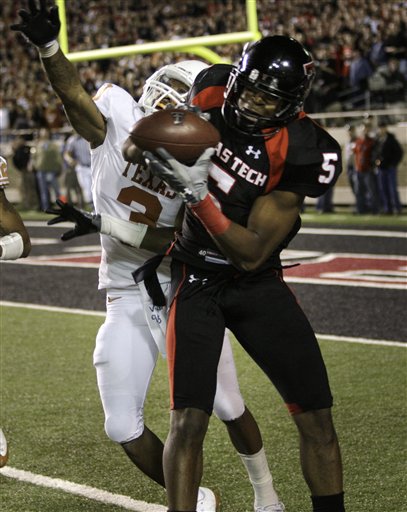Top 10 TV Shows
As one might suspect when surveying myriad media scholars on their top television shows, we received submissions for all sizes, shapes, and genres: from Puppy Bowl IV to Charlie Rose, from The Young and the Restless to Chuck. Some striking trends: most scholars submitted a few well-known programs (whether in popular in scholarly discourse) and a few wild cards: Mad Men next to Househunters International, etc. We also noted the complete absence of several “hot” shows (True Blood, Californication, In Treatment) as well as the negligence of formerly-championed favorites (Grey’s Anatomy, Heroes, Desperate Housewives). Ultimately, the list illuminates the trend in recent television and media studies toward shows that demonstrate “narrative complexity” and engage the discourse of “quality TV.” The Daily Show and The Rachel Maddow Show are obvious exceptions — or are they? Commentaries on individual shows are extracted from initial responses and/or provided by Flow staff and alumni.
- (Tie for first) Mad Men and 30 Rock
Mad Men
It’s all about patience. Mad Men takes its sweet time building character arcs and turning points, spreading plot lines over multiple episodes in a tele-visual exercise in calm restraint and quiet revelation. And yet, for a show rooted in the oft-rehearsed ’50s and ’60s, Mad Men ‘s second season has proven anything but predictable. No less than a two dozen remarkable performances anchor the show; the female characters challenge, conform to, and defy expectations as they negotiate the crescendo towards Second Wave Feminism. Peggy’s season finale refusal, Joan pinned to the office floor, Betty still in her party dress, collapsing into herself on the bed in the fading light, the list of searing moments could fill the entire column. After Mad Men swept the Emmy’s, “heads rolled” at HBO, which had failed to option the pitch by show runner (and former Soprano‘s writer) Matthew Weiner. Here’s hoping they’ve learned their lesson.
Mad Men and 30 Rock 30 Rock
It should come as no surprise that 30 Rock appears at the top of this list. After all, it’s a veritable treasure trove for media scholars. We write about it because Tina Fey and her character, Liz Lemon, have become intertwined to form a complex feminist icon. We investigate the series’ tendency to bite the hand that feeds through its flaunting and evisceration of GE/NBC/Universal/Sheinhardt Wig Company product integortion (integortion? No, that’s not right.) and synergy. And of course, we love 30 Rock because it is exhiliratingly and devastatingly hilarious. Sure, while it was gratifying to witness Tina Fey shoot to superstardom due to her Sarah Palin impression, it was simultaneously distressing to see 30 Rock resort to awkward guest spots in a bid for ratings. Still, a million somnambulistic appearances by a million bored Steve Martins wouldn’t be enough to suppress the boundless comic invention, screwball genius, and caustic wit of Fey and company (Evan Elkins). - The Wire
The critical refrain on Season 5 is simple: it was too outlandish, too vitriolic, and took the tremendous satirical turn of McNulty’s serial killer too far. It failed to live up to the full-court poignancy press that defined Season 4; it became too much of a mouthpiece for David Simon’s indictment of conglomerate journalism and city government. And while these complaints are well-heeded, Season 5 continued to offer the sort of complex storytelling and difficult characterization that have defined the series from its beginning. Several key story lines went out with a whimper instead of a narrative bang, further emphasizing Simon and Co.’s commitment to social realism and their defiance of the conventions of serial plotting. There are few more beautiful moments in the series than Snoop’s ultimate look in the mirror or a full-suited Marlo proclaiming his presence into the frigid night air. With its telegraphing of fates and neatly-placed doubles, some might consider the final episode too trim a conclusion for a series typified by open-ended ambivalence. But I left the series with a distinct sense of place, possibility, despair and doubt — in large part due to the suggestiveness of the finale. At this fall’s Flow Conference, we debated a consideration of The Wire as melodrama in the Peter Brooks’ conception of the term: a narrative that bestows characters with greater societal meanings in an attempt to render our world, in some fleeting way, morally legible. While The Wire doesn’t offer moral legibility as much as moral and social ambiguity, it does enact equally important tasks of classic melodrama: it portrays a harsh, unforgiving world, tackles social institutions, and sides with the disenfranchised. Ultimately, The Wire is melodrama for a post-urban America: in its extended look to the streets, docks, schools, and social chasms of one of America’s oldest and most troubled cities, it, at the very least, brought an formerly illegible world to light (Annie Petersen).

The Wire - Lost
As flawed as it may be, the show should be praised for not having one single formula that it follows for each episode (a practice that is endemic on network TV, with the proliferation of procedurals that are basically weekly riffs on a central conceit). As each season expands the show’s diegetic world in both time and space, it is increasingly difficult to remember that the show started relatively simply with a bunch of people crash-landed on an island having flashbacks. Last season’s expansion practically requires that the creators constantly assure us that they have a master plan that will tie every bizarre tangent and conspiracy together, though one can’t help suspect that the show itself is one big socio-narrative experiment with Lindelof as the lead scientist and us as the subjects. I don’t think it would be too aggrandizing to refer to Lost as the best Experimental Television on television. (Elliot Panek)
- Pushing Daisies
Unlike almost anything else out there, the show is festooned with quirk and whimsy, offering a storybook tale of magical realism and romance. It looks more stylish than anything else I’ve seen recently, and the cast is utterly charming, with extra praise for Anna Friel, who completely owns the screen whenever she’s on. It started strong in the ratings, dwindling a bit throughout the fall but still maintaining a healthy viewership. And then the writer’s strike hit, grounding the series in the midst of a cliff-hanger. ABC mismanaged the show post-strike, putting it on hiatus until the fall, then underpromoting it. With arguably the best production design in the history of television, it seems Pushing Daisies was too expensive – and too beautiful – to live (Jason Mittell).
- The Daily Show with Jon Stewart
Rather than search for “The Truth” behind media spin, Jon Stewart (and talented cast) continually call attention the fact that “The News” is not reality, but rather a representation of reality — a series of narratives spun from symbolic and material phenomena. The Daily Show‘s biting yet goofy critiques of the world of mediated politics asks us not to choose between “reality” and narrative, instead asking us which narratives we’d prefer: those that are humane, inclusive, and hopeful, or those that are xenophobic, exclusive, and hateful (David Uskovich).
- Battlestar Galactica
Battlestar fans have taken an exciting, emotional ride over the last several years and, as the series wraps up its final season, creator Ronald D. Moore has given fans a reason to get excited again. While BSG seemed to be crawling towards a series finale involving the discovery of Earth, Moore apparently has other plans. Smack-dab in the middle of the season, Earth is found and not quite what it was cracked up to be. Fleet-wide morale is at an all time low and political dissention is in the works. Recent episodes have harkened back to an urgency and exhilaration found in early episodes such as “33” and “The Hand of God”. Other reasons why season 4 has rocked: Starbuck’s back bitches, Adama and Tigh are BFFs again, and Rosalind’s getting back into the ring to take down Zarek (Allen Lindig).
- Dexter
Though in many ways a standard procedural drama, Dexter creates thrilling suspense via viewer identification with its morally contingent hero. Smartly written and often funny, this “quality” Showtime drama combines serious and sometimes graphic violence with a quick wit and the humor of everyday life. As we follow Dexter on his journey of self-discovery, our hopes that he might discover the endearing friend, brother, and lover within him conflict with the seriously disturbing idea of seeing glimpses of ourselves in a serial killer and the desire for the series to go on (Laura Jacquelyn Simmons).
- Friday Night Lights
A small Texas town, a football team, a bunch of high school kids, a marriage. Sounds by turns quotidian and dreadfully cliche. Wrong. While many complained of Season Two’s melodramatic flourishes and flips, Friday Night Lights continues to offer poignant, nuanced, and understated portraits of life in working-class America. Nevermind that it’s filmed in Flow‘s beloved home of Austin, Texas – FNL gets at the heart of human existence. Sure, that’s a cliche in and of itself. But it’s the best way to describe this “Little Show That Could” — destined, it seems, to become another victim of NBC’s inability to appropriately market or program the quiet televisual gem
- The Rachel Maddow Show
The Daily Show and The Colbert Report might be funnier. Countdown with Keith Olbermann might be more polemical. Yet Maddow, whose show debuted this year just in time to deliver intellectual, insightful, and inspired commentary on the Presidential election, manages to combine elements of all of them and still maintain a sense that this is the news, without resorting to outright parody or bombast. Furthermore, Maddow is an out lesbian and holds a doctorate, making her presence on the nightly news a genuine change from the old, straight, white men who have so long delivered America’s “essential” information (Peter Alilunas).

Rachel Maddow


- Honorable Mentions:
- Tim and Eric Awesome Show, Great Job!
Whatever is said about Tim and Eric Awesome Show, Great Job! misses the point. Tim Heidecker and Eric Wareheim have created an alternative “sketch”-“comedy” program, one so weird it will never be good even if it is the best, and most creative, show on television. It features the twisted half-ideas of un-charismatic anti-stars, men too ugly and too smart to be on TV. Its comedy is so uncomfortable that it would make Andy Kauffman nervous. The show’s best feature, however, is the haphazard mode of production; in mimicking the aesthetic of public access television, Heidecker and Wareheim have inserted a truly unique look into the cable-tv formula. Each episode lasts a mere eleven minutes, allowing the two friends to be concise and prolific; but be warned, watching more than one episode at a time may be dangerous to your health (Daniel Metz).
- NCAA Football: University of Texas Longhorns vs. Texas Tech Red Raiders
Televised sports garners huge ratings, has enormous fanbases, and is the very definition of unscripted entertainment—yet it receives virtually no critical praise for its frequent electrifying drama. This game, which featured the #1 ranked Longhorns versus the #5 ranked Red Raiders, was decided in literally the last second as the Red Raiders scored a touchdown on an improbable pass, catch, and run into the end zone. It was the most thrilling moment in all of televised sports this year—and yes, that includes anything by Michael Phelps (Peter Alilunas).
- Breaking Bad:
I’ll admit this show was off my radar screen until Bryan Cranston walked away with a well-deserved 2008 Emmy Award for best actor in a drama series. Indeed, the series – about a terminally ill chemistry teacher (Cranston) who starts cooking crystal meth for the sake of his family’s financial future – is an acting powerhouse. But the show’s most powerful draw is its innovative mix of dark comedy, melodrama, and morality play. Few other shows are willing to put all three modes into action simultaneously. Watching our protagonist and his druggie sidekick react to what happens after they mix a little acid with a dead body in an upstairs bathtub, for example, is, in equal parts, hilarious, disgusting, and, ultimately, sad. Weeds may have done it first, but Breaking Bad does it better (Kevin Sanson).

Image Credits:
1. 30 Rock and Mad Men
2. The Wire
3. Pushing Daisies
4. Dexter
5. Rachel Maddow
6. Crabtree’s winning catch
Please feel free to comment.
In the honorable mentions categories here, I would like to add my suggestions of The View – which strangely and consistently provides some of the most interesting political dialogue on TV – and The Soup – which has steadily become one of my weekly pleasures. Both would seem to offer a counterweight (and thus represent some Reality TV) to some of the narrative shows you have listed.
Peter, I completely agree that sports shouldn’t be left out of lists such as these. Unlike single episodes of even the most successful television series, I think it could be argued that great moments in sports (such as Crabtree’s pass) are talked about and remembered for years and even decades to come.
The tie between “Mad Men” and “30-Rock” seems somewhat symptomatic of contemporary television scholarship at the moment.
One is a program about media-insiders at the cusp of full network dominance, the other about media-insiders pretending network television still exists in some vital form. Both also recall an era when the concretized time/space fantasies of New York still held sway as a meaningful center of cultural production (before being replaced by various iterations of an L.A. inflected digital diaspora). Are we lamenting the passing of the unconverged (much like Fey’s desperate Emmy attempt to get someone, somewhere to watch her show…even if not on television itself)?
Pingback: Stylish Home Awards Mirrored Televisions | Latest Mirror TV's
Wow, that’s what I was exploring for, what a data! existing here at this blog, thanks admin of this site.